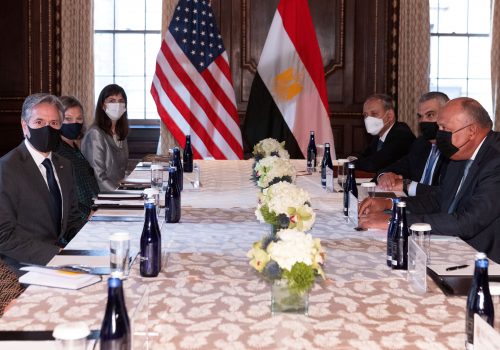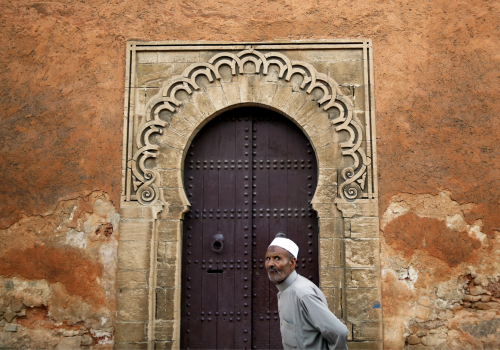Deputy assistant secretary of state for North Africa: The best way to counter corruption is to strengthen democracy
A decade after the onset of the Arab Spring, North Africa continues to face many of the same challenges that spurred initial protests in 2011. Additionally, the coronavirus pandemic has only further exacerbated growing economic and social frustrations in the region. On October 27, the Atlantic Council’s North Africa Initiative hosted an event with the Italian Institute for International Political Studies (ISPI), discussing the implications of current political, socio-economic conditions and future challenges North Africa faces.
The event featured opening remarks by Frederick Kempe, President and CEO, Atlantic Council; Giampiero Massolo, President, ISPI; Mariangela Zappia, Ambassador of Italy to the United States; and keynote speaker Karen Sasahara, Deputy Assistant Secretary of State for North Africa. The event also hosted a panel discussion on future trends that could impact the region with Youssef Cherif, Director, Columbia Global Centers; Intissar Fakir, Director, Middle East Institute; Kristina Kausch, Senior Fellow, The German Marshall Fund of the United States; Elham Saudi, Director, Lawyers for Justice in Libya; and Yahia Zoubir, Professor of International Studies & International Management, KEDGE Business School.
The event was accompanied by a publishing of the joint report: “North Africa 2030: What the future holds for the region” in partnership with the ISPI. The report, edited by Karim Mezran and Armando Sanguini, included contributions from regional experts including Yahia Zoubir, Abdelkader Abderrahmane, Pietro Gagliardi, Aldo Liga, Hannah Abdullah, Nader Kabbani, Shlomo Roiter Jesner, and Alissa Pavia. Their analyses highlight the wide array of challenges the region continues to face, including transnational terrorism, illegal migrant smuggling, poor local governance, and lack of basic infrastructure.
Remarks from Keynote Speaker Karen Sasahara
- Highlighting greater trends and challenges facing North Africa, including climate change, water security, population growth, and inequality, Karen Sasahara argued that these factors threaten stability in the region.
- Emphasizing the threat climate change poses to North Africa, Sasahara described the effects of desertification and its likelihood of increasing conflict for resources, which could eventually feed into terrorism.
- Discussing population growth in North Africa, she underscored the inability of governments in the region to keep sustaining social and economic programs that are widely depended on by citizens.
- Sasahara emphasized the growing economic inequality and corruption in the region, which continues to threaten stability and has motivated violent extremism.
- Sasahara acknowledged that the best way to counter corruption is to strengthen democracy, emphasizing that necessary political and economic reforms may be the only solution to move forward.
- Finally, she urged political leaders in Libya to compromise and agree on a basis for the presidential elections in December, while also emphasizing the need for Tunisia to return to a democratic path.
Instability, challenges, and transformations in North Africa
- Yahia Zoubir discussed the emerging opportunities the pandemic has created in bringing to life government shortcomings and mismanagement across sectors, helping realize the necessary reforms needed to ensure stability.
- Highlighting North Africa’s challenges with economic development, Zoubir argued that youth marginalization and unemployment continue to drive violent extremism and illegal migration, which threatens the stability in the region.
- Intissar Fakir unpacked the ongoing diplomatic crisis between Morocco and Algeria, highlighting economic and political factors that contributed to the deterioration of the relationship between both countries.
- Emphasizing the role of domestic factors in deteriorating diplomatic relations, Fakir pointed out that Algeria’s Hirak movement, which ousted former President Abdelaziz Bouteflika, still hasn’t had many of their demands satisfied by the transition taking place. In response, Algeria’s decision to escalate diplomatic tensions with Morocco reinforces their military’s importance while also regaining domestic credibility.
- Agreeing with Zoubir, Fakir highlighted the impacts of the diplomatic crisis between Morocco and Algeria in destabilizing both countries’ regimes domestically, noting that neither country has popular buy-in.
- Youssef Cherif reflected on the status of democracy in Tunisia following President Kais Saied’s suspension of the constitution and parliament last July. Cherif argued that the democratic backslide will continue to deteriorate Tunisia’s newfound relationship with Western allies, which might lead to Saied defying diplomatic pressures and returning the country to an authoritarian path.
- Highlighting domestic threats to Saied’s rule, Cherif posited that the president’s legitimacy would deteriorate as the economic situation in the country gets worse. With the regime threatened, Cherif remained apprehensive about the trajectory of reforms and human rights in Tunisia.
- Elham Saudi emphasized international concerns regarding the December elections in Libya, highlighting the lack of transparency and policy planning in the country’s election process. She noted that these factors would offer the perfect opportunity for the election to be questioned, which could further drive political violations and violence.
- Kristina Kausch underscored the political vulnerability of North Africa caused by long-unaddressed structural issues in the region. She explained that these vulnerabilities make the region easy prey for foreign intervention from emerging powers like China and Russia, who are looking for opportunities to harvest leverage in the region.
Policy Recommendations
- Sasahara warned that the consequences of inaction on climate change in North Africa will only further exacerbate the increasing instability, which could increase violence in the region. She discussed new approaches that the United States is developing in combating this threat, outlining initiatives that could increase action on climate policy. She reaffirmed that the US would continue to push for climate action wherever possible.
- Sasahara explained that the best way to combat the rampant corruption in the region is to strengthen democratic institutions. She echoed President Joe Biden’s “We have to prove that democracy still works” sentiment, emphasizing the US role in promoting democracy in the region.
- Sasahara advocated for more pro-transparency and anti-corruption measures to be adopted by North African states. Zoubir argued that recent reforms hadn’t gone far enough in addressing the root causes of instability in the region. He noted the importance of cooperation among regional actors and advocates for reviving the Maghreb Union. Zoubir also pointed out that Libya’s post-conflict reconstruction could bring about greater wealth to the region, which could further cooperation among regional leaders.
- Fakir noted that the more “intangible loss” is the fact that there is even less bringing Morocco and Algeria together, limiting both countries’ ability to backtrack on escalating tensions. Focusing on greater cooperation could drive a more positive relationship between the two.
- Saudi emphasized that democracy is impossible to achieve without citizens believing they can hold institutions and actors accountable. She urged Libyan leaders to agree on a roadmap for the election process, one that is free of disenfranchisement and corruption. She also noted that the ongoing struggle for democracy in Libya had been underserved by the international community’s emphasis on political expediency at the cost of due process.
- Kausch recommended that North African leaders take more action in curbing foreign intervention in the region. She emphasized that solutions should not be expected to come from the outside. Rather, regional leaders must cooperate to fix the issues their countries face.
Yaseen Rashed is a Young Global Professional with the Middle East Programs at the Atlantic Council.
Further reading
Thu, Nov 4, 2021
What will the US-Egypt Strategic Dialogue look like? Here’s a preview.
MENASource By Allison Nour
The US-Egypt Strategic Dialogue is one of the longest-standing in the region. Though primarily symbolic, the dialogue serves as an opportunity for senior-level engagement across a broad swath of bilateral priorities.
Tue, Oct 26, 2021
North Africa 2030: What the future holds for the region
Report By
In the last decade, several events redefined North Africa’s heterogeneous character and identity. This year marks the tenth anniversary of the beginning of the Arab spring, but most of the root causes fueling the unrest remain unaddressed.
Tue, Dec 23, 2014
The case for a new federalism in Libya
Issue Brief By
Following Muammar Qaddafi’s ouster more than three years ago, Libya fragmented, and the absence of a capable central government opened up the space for a violent political struggle over the country’s key resources and state institutions that continues today. Given Libya’s troubled history with centralization, there is a need for a rethink about a post-revolutionary […]

